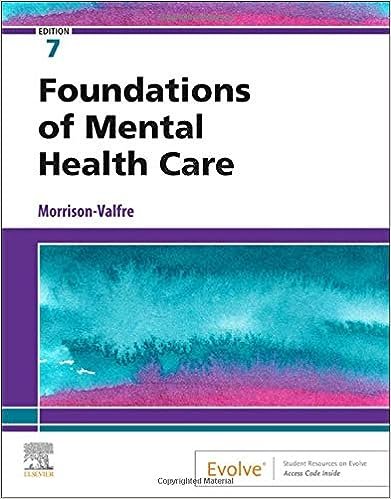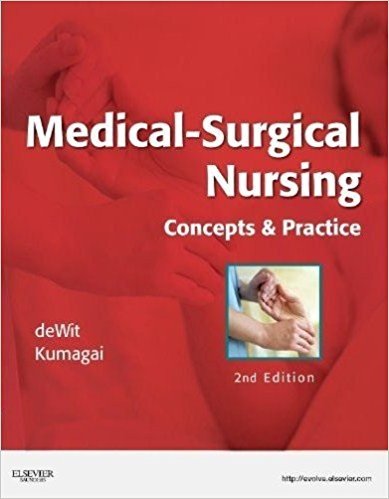Test Bank for Foundations of Mental Health Care 7th Edition Morrison-Valfre
Chapter 09: Mental Health Assessment Skills
Morrison-Valfre: Foundations of Mental Health Care, 7th Edition
MULTIPLE CHOICE
1. The nurse asks the client a series of questions upon entry into a mental health care system.
This action is an example of which phase of the nursing process?
a. Evaluation
b. Assessment
c. Intervention
d. Planning
ANS: B
Assessment is the phase of the nursing process during which data collection occurs. It is
performed not only upon admission into a facility but also throughout the care of the client.
Evaluation is the phase during which goals are evaluated to determine whether they have
been met, partially met, or not met at all; intervention is the phase of the nursing process
when planned interventions are actually implemented; planning is the phase of the nursing
process when client goals are set and interventions are planned.
DIF: Cognitive Level: Comprehension REF: p. 95 OBJ: 2
TOP: Nursing (Therapeutic) Process KEY: Nursing Process Step: Assessment
MSC: Client Needs: Health Promotion and Maintenance
2. A nurse administers antidepressant medication to a client in an assisted-living facility. This
is an example of which phase of the nursing process?
a. Intervention
b. Assessment
c. Planning
d. Diagnosis
ANS: A
Intervention is the phase of the nursing process during which planned interventions are
actually implemented. Assessment is the phase of the nursing process when data collection
occurs. Planning is the phase of the nursing process when client goals are set and
interventions are planned. Diagnosis is the phase of the nursing process following
assessment when the client’s problem is identified.
DIF: Cognitive Level: Comprehension REF: p. 94 OBJ: 2
TOP: Nursing (Therapeutic) Process KEY: Nursing Process Step: Intervention
MSC: Client Needs: Physiological Integrity
3. Following completion of a male client’s series of group therapy sessions, the nurse
periodically talks with the client to determine whether he has any signs of relapse of his
previous problems. This action by the nurse is an example of:
a. planning.
b. assessment.
c. intervention.
d. diagnosing.
ANS: B
In this situation, the nurse is assessing for any signs of relapse. Assessment is a continuous
process. Planning is the phase of the nursing process when client goals are set and
interventions are planned; intervention is the phase of the nursing process when planned
interventions are actually implemented; and diagnosis is the phase of the nursing process
following assessment when the client’s problem is identified.
DIF: Cognitive Level: Comprehension REF: p. 96 OBJ: 2
TOP: Nursing (Therapeutic) Process KEY: Nursing Process Step: Assessment
MSC: Client Needs: Health Promotion and Maintenance
4. During a session with a female client with a diagnosis of social phobia, she talks about how
proud she is of herself because she was finally able to shop at the grocery store. The nurse
documents the events and knows that this would be considered which phase of the nursing
process?
a. Assessment
b. Planning
c. Intervention
d. Evaluation
ANS: D
This client has accomplished a goal; therefore, this would be considered evaluation.
Assessment is the phase of the nursing process when data collection occurs; planning is the
phase of the nursing process when client goals are set and interventions are planned; and
intervention is the phase of the nursing process when planned interventions are actually
implemented.
DIF: Cognitive Level: Comprehension REF: p. 94 OBJ: 2
TOP: Nursing (Therapeutic) Process KEY: Nursing Process Step: Evaluation
MSC: Client Needs: Health Promotion and Maintenance
5. The treatment team meets with a client for the first time and determines, with the client’s
input, a nursing diagnosis, goal, and steps to reach this goal. In addition to a nursing
diagnosis, the treatment team has completed which phase of the nursing process?
a. Evaluation
b. Intervention
c. Planning
d. Assessment
ANS: C
During the planning phase, goals are established and a plan is developed. Evaluation is the
phase in which goals are evaluated to determine whether they have been met, partially met,
or not met at all; intervention is the phase of the nursing process when planned interventions
are actually implemented; and data collection occurs during the assessment phase.
DIF: Cognitive Level: Comprehension REF: p. 94 OBJ: 2
TOP: Nursing (Therapeutic) Process KEY: Nursing Process Step: Planning
MSC: Client Needs: Health Promotion and Maintenance
6. Without assessment of six specific aspects of an individual’s being, the mental health
nurse’s scope of care is narrow and limited in effectiveness. These aspects include social,
physical, cultural, intellectual, emotional, and spiritual areas of a person’s life, known as a
assessment.
a. complete
b. accurate
c. holistic
d. psychiatric
ANS: C
Although the other options do address some of these aspects, holistic more accurately
describes these six aspects of an individual’s life. The psychiatric assessment tool
specifically addresses the problems that are being experienced, coping mechanisms, and
resources of the client.
DIF: Cognitive Level: Knowledge REF: p. 96 OBJ: 4
TOP: About Assessment KEY: Nursing Process Step: Assessment
MSC: Client Needs: Psychosocial Integrity
7. The nurse is reviewing information regarding a female client that was obtained with the
psychiatric assessment tool. The client’s ability to provide food and shelter for herself is
included in which area of the assessment?
a. Appraisal of health and illness
b. Coping responses, discharge planning needs
c. Knowledge deficits
d. Previous psychiatric treatment
ANS: B
The client’s ability to care for herself outside of the facility would be considered when her
discharge planning needs are assessed, to determine whether other resources will be
necessary. The other options are included in the psychiatric assessment tool but do not focus
on discharge planning. Appraisal of health and illness focuses on the client’s perception of
health care and identification of problems and goals; knowledge deficits focus on areas such
as medications and coping skills; and previous psychiatric treatment focuses on the client’s
psychiatric history, including family history.
DIF: Cognitive Level: Comprehension REF: p. 96 OBJ: 4
TOP: Assessment Process KEY: Nursing Process Step: Assessment
MSC: Client Needs: Psychosocial Integrity
8. During an interview with a 15-year-old female client admitted for depression, the nurse is
disappointed to learn that the client recently became pregnant and had an abortion. The
nurse is contradicting the effective interview guideline of:
a. paying close attention to the client’s nonverbal communication.
b. avoiding making assumptions.
c. avoiding one’s personal values that may cloud professional judgment.
d. setting clear client goals.
ANS: C
This is an example of the nurse allowing his or her personal values to cloud professional
judgment and is an ineffective interview technique that leads to a negative nurse-client
relationship. The other options are good interview techniques but do not represent this
situation.
DIF: Cognitive Level: Comprehension REF: p. 96 OBJ: 5
TOP: Effective Interviews KEY: Nursing Process Step: Assessment
MSC: Client Needs: Psychosocial Integrity
9. A male client with a history of schizophrenia was admitted to the mental health facility after
he was found on the street confused and uncooperative when approached by the police. One
of the first assessments that should be performed on this client upon admission is a:
a. physical assessment.
b. sociocultural assessment.
c. psychosocial assessment.
d. psychiatric assessment.
ANS: A
Physical problems frequently are overlooked when someone has a diagnosed mental health
disorder. These physical problems often can be the cause of symptoms and may be easily
treated. For example, low blood sugar, rather than schizophrenia, could be a cause of the
symptoms described in this scenario. For this reason, physical examinations are always
performed on admission to a mental health facility, followed by the other options listed.
DIF: Cognitive Level: Application REF: p. 98 OBJ: 6
TOP: Physical Assessment KEY: Nursing Process Step: Assessment
MSC: Client Needs: Physiological Integrity
10. During the mental status examination, the nurse observes that the client rapidly changes
from one idea to another related thought. Which disordered thinking process is the client
displaying?
a. Delusions
b. Perseveration
c. Confabulation
d. Flight of ideas
ANS: D
It is difficult to follow a conversation with an individual who is experiencing flight of ideas
because the conversation follows his rapidly changing thought pattern. Delusions result in
false beliefs that cannot be corrected by logical explanations or reasoning; perseveration
occurs when the client repeats the same word response to different questions; and with
confabulation, the client uses untrue statements to fill in gaps of memory loss.
DIF: Cognitive Level: Comprehension REF: p. 100 OBJ: 9
TOP: Thinking KEY: Nursing Process Step: Assessment
MSC: Client Needs: Psychosocial Integrity












Reviews
There are no reviews yet.